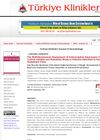 1 citations,
July 2023 in “Journal of Clinical Medicine”
1 citations,
July 2023 in “Journal of Clinical Medicine” Different causes of beard hair loss have various treatments, including medications, lifestyle changes, and procedures to stimulate hair growth.
 1 citations,
May 2022 in “Pharmaceutics”
1 citations,
May 2022 in “Pharmaceutics” Tea seed oil in nanostructured carriers stimulates hair growth and feels less greasy when applied.
1 citations,
January 2020 in “Bioscience Reports” Long-term use of finasteride in women can cause hormonal changes, DNA damage, and menstrual issues.
 February 2024 in “Biomedicines”
February 2024 in “Biomedicines” Hormones like androgens, estrogen, thyroid hormones, and stress hormones can contribute to hair loss, and treatments target these hormonal imbalances.
 January 2022 in “Turkiye Klinikleri Journal of Dermatology”
January 2022 in “Turkiye Klinikleri Journal of Dermatology” The Turkish version of the MAIA-2 Scale is valid and reliable for patients at a dermatology clinic.
 December 2015 in “Vestnik dermatologii i venerologii”
December 2015 in “Vestnik dermatologii i venerologii” People with hair loss have different hormone levels, and these hormones can affect hair growth.
 11 citations,
January 2001 in “Cambridge University Press eBooks”
11 citations,
January 2001 in “Cambridge University Press eBooks” Androgens can cause hair growth in some areas but hair loss on the scalp.
 8 citations,
July 2012 in “Cambridge University Press eBooks”
8 citations,
July 2012 in “Cambridge University Press eBooks” Androgens can both increase body hair and cause scalp hair loss.
February 2010 in “Journal of the American Academy of Dermatology” The shampoo and conditioner improved dry, damaged hair significantly after three uses.
 40 citations,
February 2012 in “Dermatology Online Journal”
40 citations,
February 2012 in “Dermatology Online Journal” Lasers might help hair growth in some alopecia cases, but more research is needed to confirm their effectiveness and safety.
 14 citations,
May 2020 in “Archiv für Tierzucht”
14 citations,
May 2020 in “Archiv für Tierzucht” Researchers identified genes that may affect hair growth in Cashmere goats.
June 2022 in “Indian Journal of Ophthalmology/Indian journal of ophthalmology” Early and aggressive treatment is crucial for preserving vision in infants with AEC syndrome.
143 citations,
January 2004 in “Journal of Investigative Dermatology Symposium Proceedings” Alopecia areata is an autoimmune disease causing hair loss, treatable with immune-modulating drugs, and linked to genetics.
24 citations,
March 2009 in “Archives of dermatological research” The combination of oral PUVA and corticosteroids helps regrow hair in severe alopecia areata.
11 citations,
December 2017 in “Orphanet Journal of Rare Diseases” A new mutation in the ST14 gene broadens the understanding of ichthyosis-hypotrichosis syndrome.
 3 citations,
January 2022 in “Scientific Reports”
3 citations,
January 2022 in “Scientific Reports” A new treatment called SAMiRNA-AR68 increases hair count in people with hair loss, showing similar results to existing treatments but without side effects.
 1 citations,
May 2012 in “Hair transplant forum international”
1 citations,
May 2012 in “Hair transplant forum international” Hair loss in men may be caused by inflammation triggered by hormones, and treatments reducing inflammation could potentially promote hair growth.
 November 2024 in “International Journal of Molecular Sciences”
November 2024 in “International Journal of Molecular Sciences” Nanoparticles may improve caffeine delivery for hair growth, offering a potential alternative to minoxidil for hair loss treatment.
 April 2024 in “AAPS PharmSciTech”
April 2024 in “AAPS PharmSciTech” New microneedle method improves hair regrowth treatment delivery.
 August 2022 in “Case reports”
August 2022 in “Case reports” Isotretinoin effectively treated a rare scalp condition, but careful drug monitoring and a dairy-free diet were important.
66 citations,
February 2007 in “The journal of investigative dermatology/Journal of investigative dermatology” Adenosine may promote hair growth by increasing FGF-7 levels in dermal papilla cells.
37 citations,
August 2019 in “Frontiers in Microbiology” Staphylococcus epidermidis A/C strains are more antibiotic-resistant and infection-adapted, while B strains thrive in hair follicles.
 18 citations,
June 2019 in “Clinical research in dermatology”
18 citations,
June 2019 in “Clinical research in dermatology” Acne can't be cured but can be managed with treatments like benzoyl peroxide and diet changes; it's costly and can lead to scarring and mental health issues.
 11 citations,
November 2021 in “Clinical, Cosmetic and Investigational Dermatology”
11 citations,
November 2021 in “Clinical, Cosmetic and Investigational Dermatology” Resveratrol may help hair grow, but more research is needed.
8 citations,
December 2013 in “The journal of investigative dermatology. Symposium proceedings/The Journal of investigative dermatology symposium proceedings” Mouse models help understand alopecia areata and find treatments.
3 citations,
June 2021 in “Frontiers in genetics” The protein STAT3 slows down cell growth by blocking the FST gene, which affects hair development in sheep.
 1 citations,
December 2022 in “JAMA Dermatology”
1 citations,
December 2022 in “JAMA Dermatology” The AI system HairComb accurately scores hair loss severity, matching dermatologist assessments.
1 citations,
November 2022 in “Molecules/Molecules online/Molecules annual” Some calcium supplements have more calcium than their labels say, and a few have less.
 1 citations,
January 2018 in “Journal of Cosmetics, Dermatological Sciences and Applications”
1 citations,
January 2018 in “Journal of Cosmetics, Dermatological Sciences and Applications” Ostrich antibodies helped regrow hair in men with hair loss, but the application needs to be easier.
 August 2024 in “Frontiers in Public Health”
August 2024 in “Frontiers in Public Health” Alopecia Areata severely impacts mental health, causing anxiety and depression, affecting quality of life.



















